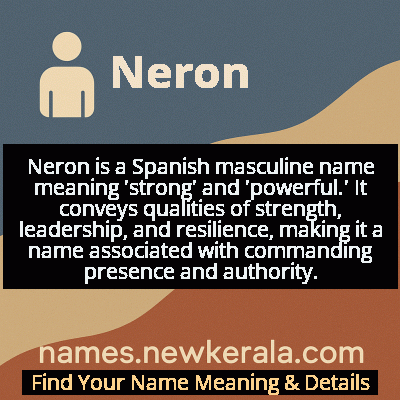Neron Name Meaning & Details
Origin, Popularity, Numerology Analysis & Name Meaning of Neron
Discover the origin, meaning, and cultural significance of the name NERON. Delve into its historical roots and explore the lasting impact it has had on communities and traditions.
Name
Neron
Gender
Male
Origin
Spanish
Lucky Number
3
Meaning of the Name - Neron
Neron is a Spanish masculine name meaning 'strong' and 'powerful.' It conveys qualities of strength, leadership, and resilience, making it a name associated with commanding presence and authority.
Neron - Complete Numerology Analysis
Your Numerology Number
Based on Pythagorean Numerology System
Ruling Planet
Jupiter
Positive Nature
Optimistic, inspirational, and creative.
Negative Traits
Scattered, exaggerating.
Lucky Colours
Yellow, gold, purple.
Lucky Days
Thursday.
Lucky Stones
Yellow sapphire.
Harmony Numbers
1, 2, 9.
Best Suited Professions
Arts, writing, communication.
What People Like About You
Creativity, optimism.
Famous People Named Neron
Nerón Claudio César Augusto Germánico
Roman Emperor
Fifth Roman emperor who ruled from 54-68 AD, known for his extensive building projects and controversial reign
Nerón de la Rosa
Spanish Actor
Spanish television and film actor known for roles in Spanish cinema and television series
Nerón Guzmán
Mexican Musician
Influential Mexican guitarist and composer in traditional Latin music genres
Name Variations & International Equivalents
Click on blue names to explore their detailed meanings. Gray names with will be available soon.
Cultural & Historical Significance
The cultural significance of Neron extends beyond its Roman origins to encompass Hispanic interpretations of strength and leadership. In Spanish literature and art, the name frequently appears as a symbol of formidable character and historical grandeur. The adaptation from the original Latin 'Nero' to the Spanish 'Neron' represents a cultural translation that maintains the essence of strength while making it more phonetically compatible with Spanish language patterns. This cultural reinterpretation allows the name to function as both a historical reference and a contemporary expression of masculine power in Spanish-speaking societies.
Extended Personality Analysis
Individuals named Neron are typically perceived as possessing strong leadership qualities, confidence, and determination. They often exhibit natural authority and the ability to command respect in social and professional settings. Their strength of character is frequently complemented by strategic thinking and ambitious goal-setting. While they can be assertive and decisive, those named Neron often balance this with charisma and persuasive communication skills. They tend to be resilient in facing challenges and possess the inner fortitude to overcome obstacles. However, this strength can sometimes manifest as stubbornness or unwillingness to compromise when they believe strongly in their position or vision.
Beyond the obvious strength associations, people named Neron often demonstrate remarkable perseverance and the capacity to handle significant responsibility. They typically approach life with intensity and purpose, whether in personal relationships or professional endeavors. Their natural authority often makes them effective in leadership positions, though they may need to consciously develop empathy and collaborative skills to balance their strong-willed nature. The name suggests someone who leaves an impression—whether through their accomplishments, their presence, or their unwavering commitment to their principles and goals.
Modern Usage & Popularity
In contemporary usage, Neron remains a relatively uncommon but distinctive name in Spanish-speaking communities. It has maintained steady but low usage rates, often chosen by parents seeking a strong, historical name with classical roots. The name experiences occasional spikes in popularity following cultural references in media or historical dramas. While not among the top names in Spanish-speaking countries, it maintains a presence particularly in families with interest in classical history or those valuing powerful, single-word names. Its usage is more frequent in certain regions of Spain and Latin America where classical names are more commonly embraced, and it continues to represent a choice for parents wanting a name that conveys strength and historical significance without being overly common.
Symbolic & Spiritual Meanings
Symbolically, Neron represents strength, authority, and resilience. The name carries connotations of imperial power and commanding presence, often associated with leadership and determination. Metaphorically, it suggests someone who can withstand pressure and overcome challenges with fortitude. The name also symbolizes historical legacy and the complex nature of power—both its constructive and destructive potentials. In psychological terms, it represents the archetype of the strong ruler or leader who must balance strength with wisdom. The symbolic meaning extends to represent enduring influence and the capacity to leave a significant mark on one's environment or community, embodying both the burdens and privileges of leadership.

